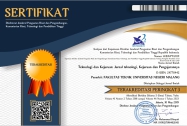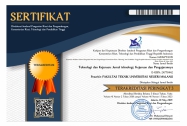Edmodo as Media to Support the Plumbing Theory Courses in Vocational Education Learning
Abstract
The purpose of the study was to determine the effectiveness of edmodos e-learning as supporting learning in the Plumbing Theory course in Vocational Education of Building Construction students. The research was conducted as the application of blended learning that carried out in an integrated manner at the Faculty of Engineering in 2019. The research method used the Quasy Experiment Method. Data collection techniques used were using multiple choice tests and questionnaires. The results of the research showed that Edmodo has been proven effective improve student learning outcomes of participants in the Plumbing Theory course. The post test results showed a significant increase after students were given treatment in the form of Edmodo utilization compared to the pre-test results that had not been given treatment. Edmodo has been proven to increase the learning motivation of students in the plumbing theory course. Edmodo has an advantage in its ease of access. Students participating in the Plumbing Theory courses access Edmodo with high intensity because it utilizes Edmodo in learning. The biggest obstacle experienced by students in accessing Edmodo is the internet network that does not support.
Keywords
Full Text:
PDFReferences
Alshawi, S. T., & Alhomoud, F. A. (2016). The Impact of Using Edmodo on Saudi University EFL Students’ Motivation and Teacher-Student Communication. International Journal of Education, 8(4), 105. https://doi.org/10.5296/ije.v8i4.10501
Arianto, F., Susarno, L. H., Dewi, U., & Safitri, A. F. (2020). Model Penerimaan Dan Pemanfaatan Teknologi: E-Learning Di Perguruan Tinggi. Kwangsan: Jurnal Teknologi Pendidikan, 8(1), 110. https://doi.org/10.31800/jtp.kw.v8n1.p110--121
Ateş Çobanoğlu, A. (2018). Student teachers’ satisfaction for blended learning via Edmodo learning management system. Behaviour and Information Technology, 37(2), 133–144. https://doi.org/10.1080/0144929X.2017.1417481
Çankaya, S., & Durak, G. (2013). European Journal of Educational Technology. 1(December 2017), 3–23.
Chaeruman, U. A. (2020). Terhadap Pembelajaran Di Era. Kwangsan: Jurnal Teknologi Pendidikan, 08(01), 142–153.
Charoenwet, S., & Christensen, A. (2016). The effect of Edmodo learning network on students’ perception, self-regulated learning behaviors and learning performance. IMSCI 2016 - 10th International Multi-Conference on Society, Cybernetics and Informatics, Proceedings, Imsci, 297–300.
Enriquez, M. A. S. (2014). Students ’ Perceptions on the Effectiveness of the Use of Edmodo as a Supplementary Tool for Learning. DLSU Research Congress, 6–11. https://doi.org/10.1017/CBO9781107415324.004
Furi, U. L., & Mustaji, Nf. (2017). Pengembangan Media Video Mata Pelajaran Komposisi Foto Digital Bagi Siswa Kelas Xi Multimedia Di Sekolah Menengah Kejuruan. Jurnal Kwangsan (Vol. 5, Issue 2, p. 10). https://doi.org/10.31800/jurnalkwangsan.v5i2.43
Gómez, A., Magreñán, A. A., & Orcos, L. (2015). UX of Social Network Edmodo in Undergraduate Engineering Students. International Journal of Interactive Multimedia and Artificial Intelligence, 3(4), 31. https://doi.org/10.9781/ijimai.2015.346
Hankins, S. N. (2015). The Effects of Edmodo on Student Achievement in Middle School.
Hoerunnisa, A., Suryani, N., & Efendi, A. (2019). the Effectiveness of the Use of E-Learning in Multimedia Classes To Improve Vocational Students’ Learning Achievement and Motivation. Kwangsan: Jurnal Teknologi Pendidikan, 7(2), 123. https://doi.org/10.31800/jtp.kw.v7n2.p123--137
Hourdequin, P. (2014). Promoting Student Autonomy with a Simple Online Learning Management System. Ocean & Coastal Management, 80(2), 132. https://doi.org/10.1016/j.ocecoaman. 2013.03.010
Koesnandar, A. (2020). Pengembangan Model Pembelajaran Inovatif Berbasis Teknologi Informasi Dan Komunikasi (Tik) Sesuai Kurikulum 2013. Kwangsan: Jurnal Teknologi Pendidikan, 8(1), 33. https://doi.org/10.31800/jtp.kw.v8n1.p33--61
Lensjø, M. (2020). Stories of learning: A case study of norwegian plumbers and apprentices in TVET at the construction site and in a training agency. International Journal for Research in Vocational Education and Training, 7(2), 148–166. https://doi.org/10.13152/IJRVET.7.2.2
Manowong, S. (2016). Undergraduate Students’ Perceptions of Edmodo as a Supplementary Learning Tool in an EFL classroom. Silpakorn University Journal of Social Sciences, 16(2), 137–161. https://www.tci-thaijo.org/index.php/hasss/article/download/65882/53831
Muslim, S., Siang, J. L., & Arum, A. P. (2019). Network based online learning program vocational school in Jakarta state university. International Journal of Recent Technology and Engineering, 8(2 Special Issue 9), 228–239. https://doi.org/10.35940/ijrte.B1052.0982S919
Nasrullah, A., Marlina, M., & Dwiyanti, W. (2018). Development of student worksheet-based college e-learning through Edmodo to maximize the results of learning and motivation in economic mathematics learning. International Journal of Emerging Technologies in Learning, 13(12), 211–229. https://doi.org/10.3991/ijet.v13i12.8636
Putra, A. B. N. R., Mukhadis, A., Poerwanto, E. E., Irdianto, W., & Sembiring, A. I. (2018). Edmodo-Based Makerspace as E-Learning Technology to Improve the Management Project of Vocational Students in the Disruptive Technology Era. 3rd International Conference on Sustainable Information Engineering and Technology, SIET 2018 - Proceedings, 302–307. https://doi.org/10.1109/SIET.2018.8693224
Rabiman, R., Nurtanto, M., & Kholifah, N. (2020). Design and development E-learning system by learning management system (Lms) in vocational education. International Journal of Scientific and Technology Research, 9(1), 1059–1063.
Ryane, I., & El Faddouli, N. E. (2020). A case study of using edmodo to enhance computer science learning for engineering students. International Journal of Emerging Technologies in Learning, 15(3), 62–73. https://doi.org/10.3991/ijet.v15i03.11252
Scott, M (2012) Go Ahead ... Be Social: Using Social Media to Enhance the Twenty-First Century Classroom. Distance Learning 9(2): 54-59.
Sugiarti, Y., Nurmayani, S., & Mujdalipah, S. (2018). Analysis of Blended Learning Implementation on Waste Treatment Subjects in Agricultural Vocational School. IOP Conference Series: Materials Science and Engineering, 306(1). https://doi.org/10.1088/1757-899X/306/1/012136
Sujadi, I., Kurniasih, R., & Subanti, S. (2017). The effectiveness of learning material with Edmodo to enhance the level of student’s probabilistic thinking. AIP Conference Proceedings, 1848(May). https://doi.org/10.1063/1.4983943
Sukatiman, Akhyar, M., Siswandari, & Roemintoyo. (2020). Implementation of blended learning in vocational student’s to achieve hot skills (V-hots). Universal Journal of Educational Research, 8(3D), 13–18. https://doi.org/10.13189/ujer.2020.081703
Sukmadinata, N. S. (2007). Landasan Psikologis Proses Pendidikan. Bandung: PT. Remaja Rosdakarya.
Swash, T. (1957). Background to the Teaching of Plumbing. Vocational Aspect of Education, 9(19), 136–143. https://doi.org/10.1080/03057875780000181
Thongmak, M. (2013). Social Network System in Classroom: Antecedents of Edmodo © Adoption. Journal of E-Learning and Higher Education, 2013, 1–15. https://doi.org/10.5171/2013.657749
Tripathi, H. (2016). Effectiveness of Blended Learning Using LMS-Edmodo in Teaching Economics at Higher Secondary Level. 3(3).
Tuna, J. R., Manoppo, C. T. M., Kaparang, D. R., & Mewengkang, A. (2018). E-Learning Development Process for Operating System Course in Vocational School. IOP Conference Series: Materials Science and Engineering, 306(1). https://doi.org/10.1088/1757-899X/306/1/012068
Wahyuni, S., Gusti Made Sanjaya, I., Erman, & Jatmiko, B. (2019). Edmodo-based blended learning model as an alternative of science learning to motivate and improve junior high school students’ scientific critical thinking skills. International Journal of Emerging Technologies in Learning, 14(7), 98–110. https://doi.org/10.3991/ijet.v14i07.9980
Wichadee, S. (2017). A development of the blended learning model using edmodo for maximizing students’ oral proficiency and motivation. International Journal of Emerging Technologies in Learning, 12(2), 137–154. https://doi.org/10.3991/ijet. v12i02.6324
DOI: http://dx.doi.org/10.17977/um031v44i12021p40-48
Refbacks
- There are currently no refbacks.
Copyright (c) 2021 Teknologi dan Kejuruan: Jurnal Teknologi, Kejuruan, dan Pengajarannya
Teknologi dan Kejuruan: Jurnal Teknologi, Kejuruan, dan Pengajarannya
E-ISSN 2477-0442 (online)
Contact
Faculty of Engineering, Universitas Negeri Malang (UM)
Jl. Semarang No 5 Malang 65145, Building H5, 1st Floor.
Homepage: http://journal2.um.ac.id/index.php/teknologi-kejuruan
Email: teknologikejuruan.ft@um.ac.id

This work is licensed under a Creative Commons Attribution 4.0 International License.



2.png)
1.png)
1.png)
1.png)
4.png)
1.png)
.png)

3.png)
1.png)
1.png)


